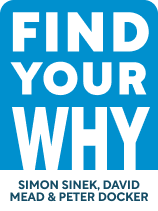

This article is an excerpt from the Shortform book guide to "Find Your Why" by Simon Sinek, David Mead, Peter Docker. Shortform has the world's best summaries and analyses of books you should be reading.
Like this article? Sign up for a free trial here .
How does a sense of purpose at work make you more successful? What would having a sense of purpose in the workplace do for you?
Discovering your unique purpose—your Why—and strengths helps you find fulfillment at work and in life. When you live in alignment with your purpose, you make better career decisions and inspire people to join you, whether as part of your team or supporters of your mission.
Read on to learn how finding your sense of purpose at work will benefit your life, according to Simon Sinek.
How Individuals and Organizations Benefit From Finding Their Why
Sinek says that making better decisions and being more persuasive benefits individuals, entrepreneurs, and organizations. Let’s explore the specific ways these benefits of having a clear purpose apply to each group:
1. Individuals: Knowing your purpose helps you get clear on what moves you. It can inject new passion into your work if it’s already fulfilling, or it can direct you toward a more fulfilling path. (Shortform note: Research confirms this. People with a clear sense of purpose experience fewer negative emotions, have a more secure self-image, and earn more money.)
2. Entrepreneurs: A defined sense of purpose in your work helps you identify and appeal to the right potential investors, clients, and customers—those with whom your message will resonate. (Shortform note: In To Sell Is Human, Daniel Pink notes that entrepreneurs must constantly sell their vision to investors, clients, or employees. Believing that what you’re selling serves a larger purpose makes you a more effective salesperson.)
3. Organizations: Knowing your organization’s purpose helps you in three ways:
First, you can increase the loyalty and creativity of your employees or members by involving them in your purpose. This can make your success more sustainable than that of organizations driven solely by profit.
Second, you can motivate and guide your teams by showing them the unique role they play within the organization and how they contribute to its broader purpose.
Third, you can more easily find and keep the right people. When you know your purpose, you can hire for what Sinek calls “cultural fit.” This matters because while you can fill skill and experience gaps through training and support, it’s hard to inspire and harness the potential of a team misaligned at its core. (Shortform note: Hiring for cultural fit can devolve into simply hiring people you identify with, which can make your organization’s culture homogeneous and unwelcoming to people from different backgrounds. Some culture experts suggest vetting candidates on specific cultural values and setting up objective frameworks to avoid this pitfall.)
| Having a Sense of Purpose at Work: Additional Benefits Besides harnessing a team’s loyalty and creativity, Chip and Dan Heath argue in The Power of Moments that a shared purpose sustains a team through challenges and boredom by keeping their work connected to a larger, meaningful mission. Also, as Gen. Stanley McChrystal explains in Team of Teams, when specific teams share an understanding of how each contributes to the purpose of the organization, they avoid working in silos, pursuing individual goals that hinder the achievement of the larger mission. Finally, Sinek contends that using your purpose to guide hiring decisions helps you avoid defaulting to tribalism. You can seek out people who are aligned with it, regardless of their demographics or affiliations, and take advantage of that diversity to push the mission forward. |
More Benefits of Discovering Your Purpose
Sinek discusses three benefits of knowing your purpose:
1. When you know your purpose, you can seek out work that fulfills you—that is, work that matters and makes you feel that you’re part of something bigger. Sinek believes everyone, no matter their role or status, deserves to find fulfillment at work. (Shortform note: Sinek draws a distinction between fulfillment and happiness, unlike traditional career advice that often conflates the two or sees them as operating in tandem. Fulfillment is lasting while happiness fluctuates. Additionally, Sinek’s understanding of fulfillment as a human need is in line with long-standing theories from psychology. Psychologist Abraham Maslow theorized that humans have five basic needs, including self-actualization, or fulfillment of our potential.)
2. Finding your sense of purpose at work helps you make more persuasive appeals to people. Your energy and commitment to your purpose are contagious, so having clarity on it helps you pitch your ideas in a way that’s more authentic and enticing to others. (Shortform note: Jack Canfield, author of The Success Principles, agrees with Sinek’s belief that having a clear purpose will inspire others to join you. Canfield adds that communicating your purpose in a compelling way is one of the main skills of great leaders.)
3. Knowing your purpose helps you make better decisions because you can measure each choice against your purpose and make the decision that best aligns with it. (Shortform note: In Essentialism, Greg McKeown suggests practical ways to filter out nonessential pursuits using your purpose: Learn to set boundaries and say “no” gracefully, learn to say “no more” to time or money investments that no longer serve you, and have an editor’s mindset to eliminate everything except what’s essential.)
Exercise: How Does Your Sense of Purpose at Work Help?
Consider how clarifying your purpose could improve your life.
- Do you feel fulfilled with the work you’re doing now? If you do, where does that sense of fulfillment come from? If not, how would your life be different if you were working at a fulfilling job?
- How would being more persuasive help you? For example, you might inspire your team or be more successful in job interviews.
- What kind of decisions would you make more confidently and why? For example, having a sense of purpose in your work might help you choose a new path for your career or choose between competing career opportunities.

———End of Preview———
Like what you just read? Read the rest of the world's best book summary and analysis of Simon Sinek, David Mead, Peter Docker's "Find Your Why" at Shortform .
Here's what you'll find in our full Find Your Why summary :
- Simon Sinek’s steps to understanding and living your purpose and your organization’s
- How to create and write your purpose statement
- What to do after you find your Why: Determine your How





